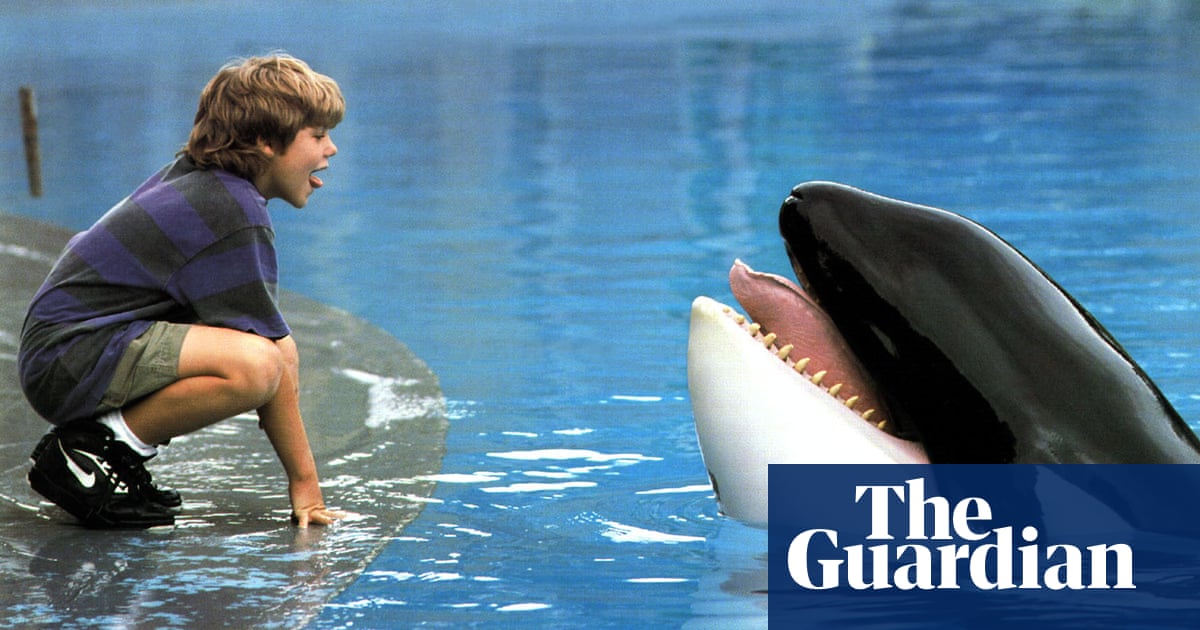
Simon Wincer, director
I loved the script but someone else was given the job of directing it. I was in Russia, shooting The Young Indiana Jones, when my agent called and said: “Guess what? They want to remove the director and offer it to you.” I flew to Los Angeles and met with Warner Bros. They showed me a video of 10 kids’ auditions and said: “Which would you like for the role of Jesse?” Jason Richter jumped off the screen. The executives smiled because that’s who they wanted, too. I met Jason the next morning. He was fascinating, a lovely kid, and away we went. I had four weeks to pull this bloody show together.
Jason built a wonderful relationship with Keiko, the whale who played Willy. He was an animal-lover and the trainers were great at integrating him. At one point, our underwater photographer slipped and broke his leg. The vibe was bad and the whale could clearly feel it: he was really down. The next day, we were filming Jesse putting on a show for the park owners but Keiko was still down. He was supposed to circle the pool, jump out and slide on to a concrete surface but the trainers couldn’t get him to do it. I said: “Why don’t we see if he’ll do it for Jason?” And – would you believe it! – the whale did it. The emotion you see on the actors’ faces is real. The whale adored this little boy.
Keiko was a beautiful creature, trapped in this undersized bowl in a theme park closed for renovation in Mexico City, but he loved the crew and the cameras, everybody being around. Afterwards, I did another movie called Operation Dumbo Drop with an elephant and found, again, that large mammals are easier to work with than many actors.
Richard Donner, our executive producer, had the same dentist as Michael Jackson. Richard wandered into the reception area one day and Michael was there, too, waiting. He mentioned this movie about a boy and a whale and Michael said he’d love to take a look. When we showed him a rough cut, he gave us the song Will You Be There.
I remember saying to my agent: “If I can deliver the finale – where the whale leaps to freedom – we’ve got a movie.” We had so many meetings about how the hell we were going to do it. It was the early days of CGI so we shot at high tide in a small harbour – and literally built a rocket launcher with an animatronic whale on it. It would fly out of the water and come to a stop then CGI would take over. Like any pivotal movie moment, it was sound, emotion and picture coming together to lift you to your feet.
The film’s success was overwhelming. After one early screening, Richard and I were standing outside. When people realised we were the film-makers, they literally offered us cash because they were so moved. There’s a credit at the end saying: “If you want to help save whales, call this number.” I think $70m was donated – and Warner Bros paid to move Keiko to a better location.
Lori Petty, played trainer Rae Lindley
We didn’t have any pre-shoot whale training but there were people on hand – real trainers – who worked at the water park in Mexico where we filmed. I was a billion times more afraid of the sea lions than I was of the whale. Imagine a 2,000-pound German Shepherd crossed with a pit bull – that’s a sea lion! They scared me to death and would taunt the whale. If Keiko was at one end of the pool, the sea lions would dive in then jump back out and be like: “Ha ha – you missed me!” They were little shits.
Keiko was fantastic, though. When I came on set, I’d say good morning to people. If I didn’t say hi to Keiko, he’d come over and blow water on me from his spout. Do you know how you say hi to a whale? You jump on his back really hard. Pounding with your fist isn’t enough – you have to jump with your feet. He also loved having his tongue rubbed. He’d open his mouth and we’d rub his tongue really hard. We’d do it every day.
Keiko was so smart – a compassionate, intelligent animal. There’s a scene where he comes out of the water and slides across a stage, as I pose with my arms out, saying: “And that’s our show!” When we were filming, Jason wasn’t where he was supposed to be. Keiko saw that and rolled himself back into the pool. He would’ve killed Jason otherwise, if he’d landed on him.
In the early 90s, awareness of whales in captivity was a new thing. Keiko had a flapped-over fin because he shouldn’t have been in such a tiny pool. He had eczema and big nasty bumps all over his body from stress. It’s like if you or I lived in a telephone booth on its side. In the ocean, whales dive down and up and out of the water and he couldn’t do that. He was basically floating around for his whole life.
Free Willy made people aware that whales don’t belong in tiny pools. They belong in the ocean – and the film incentivised children. They sent in their piggy bank money to free him. The highlight of the film is when he escapes. It was beautiful.
"freedom" - Google News
June 12, 2023 at 09:56PM
https://ift.tt/uVN927K
‘We used a rocket-launcher for his leap to freedom!’ How we made Free Willy - The Guardian
"freedom" - Google News
https://ift.tt/YAQuNjC
https://ift.tt/g9Rlwa8
Bagikan Berita Ini














0 Response to "‘We used a rocket-launcher for his leap to freedom!’ How we made Free Willy - The Guardian"
Post a Comment